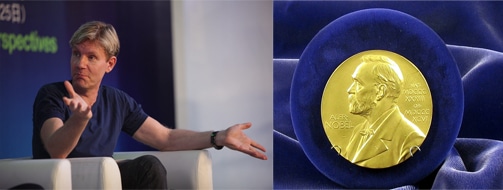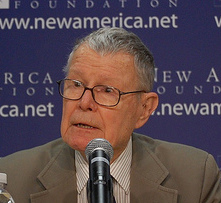As a way to sell your think tank’s ideas, get people to fund it or even just collaborate with it, there could be few more enticing prospects than being able to rub shoulders with seven Nobel prize winning economists.
In Australia, Danish climate change contrarian and head of the US-based Copenhagen Consensus Center (CCC) Bjorn Lomborg has been working overtime to respond to the fallout of the decision by one university to pull out of hosting an Australian arm of his project.
The University of Western Australia decided to hand back a $4 million taxpayer grant it was encouraged to take up by the Abbott government after students and academics complained abut Lomborg’s thin academic record and questionable methodologies.
The news has prompted a flood of media coverage, magazine spreads, television interviews and opinion columns.
But in practically every story written about the saga, journalists — and Lomborg — have stressed how the CCC works with “seven Nobel laureates” in an effort to demostrate the credibility of the contrarian think tank.
In an interview with the ABC, Lomborg said: “I think it’s a big shame in the sense of saying we work with more than 100 of the world’s top economists, seven Nobel laureates, lots of interesting people.”
When I gave the CCC the chance to respond to criticisms ahead of a post in The Guardian, the think tank’s vice president Roland Matthiason told me: “We work with more than 100 of the world’s top economists, 7 Nobel Laureates and Cambridge University Press.”
When the ABC’s Media Watch program made an enquiry to the CCC, its media manager David Lessman again stated that the centre “works with more than 100 of the world’s top economists including seven Nobel Laureates”.
Beyond the grave
So who are these “seven Nobel laureates” waiting to collaborate with any other university willing to give the CCC think tank a home in Australia?
As often turns out to be the case with matters of detail involving Bjorn Lomborg, not all is as it seems.
Firstly, it is highly unlikely that the CCC will be able to continue to work with these “seven Nobel laureates” because one of those laureates — Robert Fogel — died almost two years ago.
Fogel had only worked on one project with the CCC, its very first Copenhagen Consensus project carried out in 2004.
Putting aside the not minor oversight of the death of a Nobel laureate two years previously, what of the remaining six?
All six were awarded an economics Nobel, but the involvement of two of those laureates has been comparatively small.
Edward Prescott, who won the prize in 2004, only took part in one CCC exercise — the 2010 Rethink HIV project. Douglas North, who got his Nobel in 1993, was part of the “expert panel” on the first two major Consensus projects, the last being in 2008.
The four remaining Nobelists to have worked with CCC are Finn Kydland, Robert Mundell, Thomas Schelling and Vernon Smith.
On the CCC’s 2009 “Fix the Climate” project, Kydland, Smith and Schelling delivered a final report that attempted to argue that the “smartest” investments to combat climate change were in carbon capture, technology research and geoengineering research.
The highly controversial, unproven and ethically questionable geoengineering techniques of solar radiation management (cloud whitening and injecting the stratosphere with aerosols such as sulphur dioxide and hydrogen sulfide) were given particularly glowing endorsements for their supposed value for money.
The CCC’s latest project, the Post 2015 Consensus, had an expert panel that included only two Nobel laureates, Kydland and Schelling. This participation is enough for the CCC to sell the results of that project as the “Nobel Laureates Guide To Smarter Global targets to 2030”.
Since the first CCC project in 2004, the two Nobelists who have worked most often with the CCC as part of their “expert panels” are Thomas Schelling and Vernon Smith.
Smith is a senior fellow at the Cato Institute, a free market libertarian think tank founded by the Koch brothers, but Smith appears not to do any work related to climate or energy issues there. This is fortunate, because over the years the Cato Institute has promoted fringe views on climate science, underplayed the impacts and dismissed the need to regulate greenhouse gas emissions.
Update 27 May 2015: Vernon Smith is also a board member of the Koch-funded Mercatus Center, and has previously been affiliated with other Koch-funded entities. Smith and a team of economists received a $3 million grant from the Charles G. Koch Foundation to set up shop at George Mason University, some of the details of which can be found in this Koch Foundation proposal document. Smith is also a member of the Mont Pelerin Society, along with Charles Koch and other global industrialists as DeSmog has covered previously.
Merchants of Doubt
Thomas Schelling received his Nobel in 2005 for his work on game theory, and has participated on more CCC “expert panels” than any of the other CCC-lauded laureates.
Schelling’s long-standing position on climate change is that adaptation, research and geoengineering should be the preferred responses. This is opposed to the more obvious response, which would be to tackle the root cause of rising greenhouse gas emissions by restricting the pollution in the first place.
Schelling’s position on what to do about climate change appears to be very close to Lomborg’s.
While Schelling, pictured, no doubt deserves praise and admiration for his Nobel-winning contribution to economics, the 94-year-old has a controversial history when it comes to his thoughts and advice on climate change, offered at the highest levels in the United States.
Schelling is featured in the 2010 book Merchants of Doubt: How a Handful of Scientists Obscured the Truth on Issues from Tobacco Smoke to Global Warming by Harvard science historian Naomi Oreskes and Erik Conway.
Schelling, a professor emeritus at the University of Maryland, is heavily criticised for his role in offering policy advice through scientific reviews on climate change in the late 1970s and early 1980s.
As the book recounts, Schelling, then working at Harvard University, chaired a 1980 National Academy of Sciences (NAS) group asked to write a “letter report” on the potential impacts of climate change. The book states:
Climate change wouldn’t produce new kinds of climate, Schelling argued. But would simply change the distribution of climate zones on Earth. This suggested an idea that climate skeptics would echo for the next three decades: that we could continue to burn fossil fuels without restriction and deal with the consequences through migration and adaptation.
The book adds that Schelling had argued that fossil fuel use from 1980 onwards would probably slow anyway, making adaptation to climate change easier.
Considering all the other uncertainties that Schelling emphasized, his faith in the free market could have been viewed as surprising, and his predictions have turned out to be entirely wrong: fossil fuel use has risen dramatically over the past three decades even as global warming has accelerated.
In a 1983 NAS report, Changing Climate: Report of the Carbon Dioxide Assessment Committee, Schelling wrote the final chapter where he focused largely on the uncertainties ahead.
Schelling suggested that while climate change in the future might have grave consequences for poorer nations (singling out Bangladesh), he wrote that too much was not known back then. “It would be wrong to commit ourselves to the principle that if fossil fuels and carbon dioxide are where the problem arises, that must be where the solution lies,” he wrote.
But in Merchants of Doubt, the authors point out:
Schelling’s attempt to ignore the cause of global warming was pretty peculiar. It was equivalent to arguing that medical researchers shouldn’t try to cure cancer, because that would be too expensive, and in any case people in the future might decide that dying from cancer is not so bad.
Bjorn Lomborg continues to push the case for his think tank’s methodology to be given a $4 million taxpayer funded home somewhere in Australia. So does the Abbott government, the ministers and the conservative commentators who support him.
But as with many claims related to Lomborg’s think tank — including using the Nobel name as a form of marketing — it pays to look at the details. Unless, for example, you believe in working with Nobel laureates from beyond the grave.
Main Image Credit: Flickr/World Tourism Council and Tim Ereneta
Image credit: Flickr: New America Foundation
Subscribe to our newsletter
Stay up to date with DeSmog news and alerts







